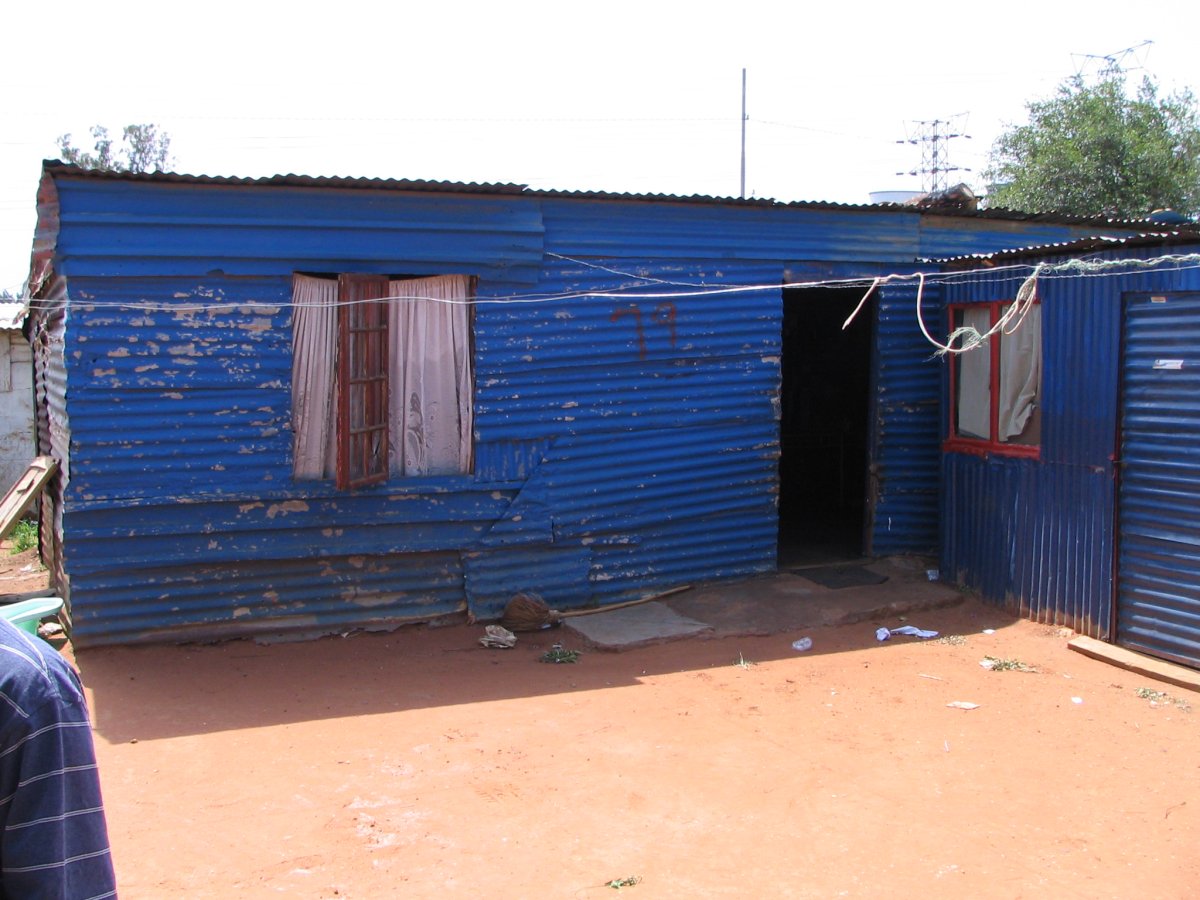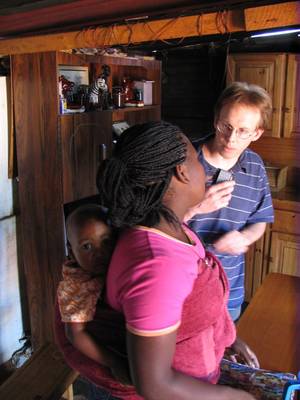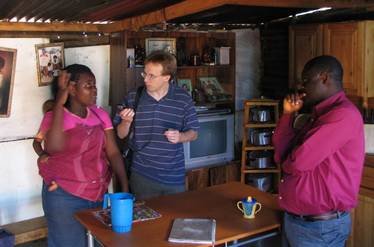Life in Soweto
Interview with
South Africa is a country of contrasts - Johannesburg no less so. It's easy to see all the new cars, expensive houses, high-rise offices but just ten minutes south of the centre lies the township of Soweto where many people live in a shack. This is little more than a simple shed. To get an idea of what life is really like for the poor in Johannesburg, we spoke to one of the residents there.
 Zareda - Hello my name is Zareda Shodwe and we are living in Soweto. We live in a shack, we don't have electricity or water yet. We have to go - maybe we pass five houses - to get water. We use gas stoves to cook and we light with candles in the house. We sometimes use the television and radio.
Zareda - Hello my name is Zareda Shodwe and we are living in Soweto. We live in a shack, we don't have electricity or water yet. We have to go - maybe we pass five houses - to get water. We use gas stoves to cook and we light with candles in the house. We sometimes use the television and radio.
Chris - How many people live here?
Zareda - Five, six with my son.
Chris - Who are those people you live with?
Zareda - My sisters. One is older and three are younger than me.
Chris - What do you do for money? You're not able to go to work, you're looking after your son so how do you live?
Zareda - We sell vegetables. My older sister sells vegetables.
Chris - And are they vegetables you buy from someone else or do you grow them?
Zareda - We grow them, down there on the other side.
Chris - So tell us a bit about life for you here. What's it actually like to live here because this is pretty basic as a means of accommodation.
Zareda - Yes. When we live here people judge us for living here. When people pass the street they look at us in a different way. They don't think of us as people. They just think of us as people within the shack. It's not nice.
Chris - You've got a television here. You haven't got any electricity so how do you run your television?
Zareda - We use a car battery.
Chris - How long does that last?
Zareda - It lasts about six or seven days.
Chris - So television and radio must be quite important for you to get information.
Zareda - Yes it is important, it is important for us.
Chris - If you could change things here, what would be the most immediate thing that would make life better?
 Zareda - Electricity. We don't mind not having houses but we just want electricity and running water in the house.
Zareda - Electricity. We don't mind not having houses but we just want electricity and running water in the house.
Chris - It's pretty draughty in here. There's holes in the roof.
Zareda - When it's hot outside the house becomes very, very hot. When it's cold the house is cold and when it rains it leaks.
Chris - What do you think is the prospects for your son? How will you make sure things go well for him?
Zareda - I don't know. If I can find a job I can make sure things go well for him.
Chris - Have you any plans of how you might make that happen?
Zareda - Yes, I do interviews. Sometimes I go for interviews but sometimes I don't get the job. Since I went for interviews I didn't get a job. I'm still sending CVs.
Chris - Were you born here?
Zareda - No, we were born in KwaZulu-Natal. My parents came here looking for a job.
Chris - And they brought you with them.
Zareda - Yes.
Chris - Do you wish in some respects they hadn't brought you here?
Zareda - No, I don't because in KwaZulu-Natal it is worse than here. The situation is worse than the one is here.
Chris - What do you think will be the situation in five years' time for you and your family?
Zareda - The government promises to change things so we hope things will have changed by then.
Chris - Now although five people and a baby living together in a corrugated metal shack not much bigger than my garage, with no electricity and no running water may sound very extreme to us. In many places the quality of life is a lot worse. Also with us in Soweto was Diran Onifade. He's a television journalist based in Nigeria. I asked him how the conditions we experienced compared with other parts of Africa.
Diran - To be honest with you, I will not describe these as very bad. I'm not measuring just by Nigeria but my fairly extensive knowledge of other African countries - because if you look at it they don't have electricity in their homes but there's still a situation where there is some illumination in the night.
Chris - Street lights and so on?
Diran - Street lights. And there is community water supply there for them 24 hours a day. They even have provisions for toilets. By African standards this is not how a squatter settlement is treated.
Chris - You're saying these people are fortunate?
Diran - In a way, yes.
Chris - It's hard to imagine worse though.
Diran - Well, you go to villages or even see who constitutes the urban poor in many African cities. It's far worse, much more people living in the same room without running water or food; toilets and, much the same way, without electricity. It's not good but it's not the worst that can happen on this continent.
Chris - How do you see places like this changing in the next five years? Do you think if we come back in five years' time we'll still be looking at the same sort of scene, a worse scene or will things have got markedly better?
 Diran - This is easy to change in the sense that they already have spaces well cut out for them. In many African cities people like them are thought of as squatters, to be flushed out. I think the most important things for them to have electricity, to work out for them to have some concrete structure. If that happens, I think their fortune is easy to turn around. Theirs is better than people who still live in mud huts with thatched roofs and things like that. There is no prospect of even getting electricity to them and there is no other pipe anywhere close by. I think it's easy to change their lot.
Diran - This is easy to change in the sense that they already have spaces well cut out for them. In many African cities people like them are thought of as squatters, to be flushed out. I think the most important things for them to have electricity, to work out for them to have some concrete structure. If that happens, I think their fortune is easy to turn around. Theirs is better than people who still live in mud huts with thatched roofs and things like that. There is no prospect of even getting electricity to them and there is no other pipe anywhere close by. I think it's easy to change their lot.
Chris - It's a bizarre environment because we drove in the car for ten minutes out of five star hotels, beautiful radio studios in the middle of Johannesburg and then we're here and it couldn't be more different.
Diran - It's what some analysts have been calling the five minute factor. Most cities, you see it in Nigeria; you see it in Ghana - wherever - most cities you just need to drive five minutes out of these cities and you'll see the flip-side of civilisation.
Ben - The trappings of cities were still actually there because when we were in that shack, Chris pointed out that she had a better DVD player than Chris has got at home.
- Previous Memories, true and false...
- Next HIV and AIDS in South Africa









Comments
p.e
are you sad living there
Add a comment